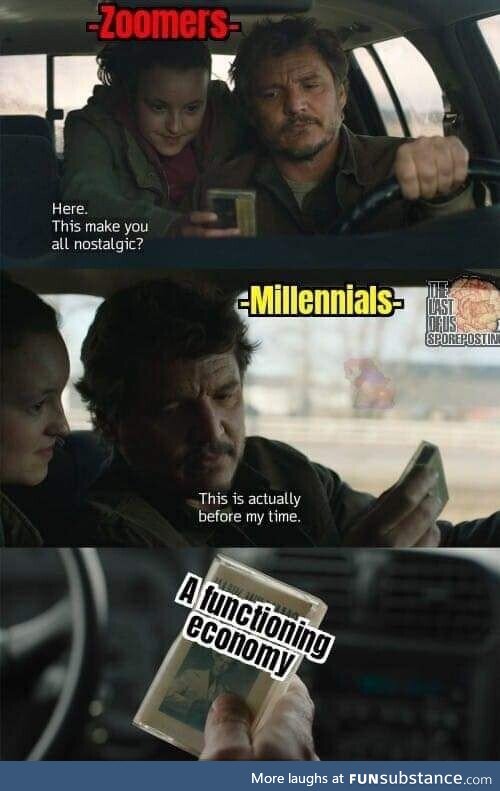Featured Posts

I wish I had a fort

The powerof positive thinking

NASA

Pray for Australia

Take care of each other

She has emerged

My soul feels so much better

I just ordered one. #Just2019HispanicThings

He really wanted his photo at the Halloween party, but was super scared of the spiders

The Only Thing More Contagious Than COVID19 Might Be This Fox's Smile
About
FAQ
Contact
Rules
Terms
Privacy
Feedback
Keyboard Shortcuts:
Previous Post · Next Post · + CTRL Skip Post
Previous Post · Next Post · + CTRL Skip Post
© 2025 FunSubstance · funny and entertaining pictures, memes, gifs & videos.



We can’t really say what a “functioning economy” really looks like- the economy has almost always been in some state of disarray or unbalance for most of modern history. The widest prosperity could be said to be the post war period, but that makes sense. Not only had technology leaped ahead in a short time but production capacity had been catapulted for the most massive war in known history. Death and destruction and deprivation left huge demand for goods and services and the consumer base exploded as troops came home and new markets…
We cannot sustain exponential growth. It can’t be done but we act like it can and in the modern age always have. Consumer mentality is that we want more, we want a stream of more and more of newer and better things. The costs carry forward and we pay them retroactively.
So I do not disagree that we have a problem. I do not think the problem is not being paid enough. The problem lies in a few places.
They said to be afraid the rich would leave if you taxed them but…. They didn’t start leaving the country with their business ant such scale until we took away the restrictions that prevented it. Property is a tool for wealth now. It isn’t a home, most Americans use property as wealth. Rentals are almost a norm now. The majority of homes being bought are being bought by people who already own property. That’s the market today.
In 1980, the median cost of a house in the US was near $65,000, while the median family income was around $20,000 (about 31% of the cost of a home). The cost to deliver a baby was around $1,500.
Today, the median cost of a house is near $425,000, while the median family income is about $55,000 (about 13% of the cost of a home). The cost to deliver a baby is around $20,000 (with insurance).
It’s not about the rising cost, it’s about the rising disproportion. It’s not just housing, but housing is a great poignant example. When you consider that in 1920 and 1980, that family income was much likely to be generated by one person working out of home than it is today, that number seems a lot more stark.
The housing industry is so mismanaged that it caused the largest financial crisis of modern times just by being ran like shit and now we are bailing out financial industries AGAIN so soon on the edge of another financial crises caused by.. surprise… mismanagement following record profitability.
with little or no regulation to force the people who profit most from them to exercise responsibility over the mess they will make.
You make a really good point about unskilled labor. I very much worry for all the people (who aren’t just kids in their first job). A lot of these jobs are already insufficient and to narrow the pool even further is going to create such a difficult situation for so many families and individuals. I live in a very rural area. I know a lot of people who work very hard, but can’t make a phone call at the end of the month because they are out of minutes, can’t afford to go to the doctor, or make home or vehicle repairs. I worry a lot about what happens next. I guess I’m just rambling. But I’m worried.